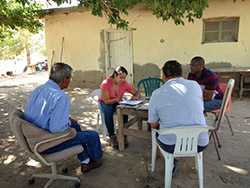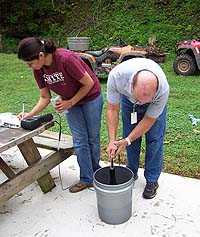What type of assignments are available at NCEH/ATSDR?

Geoffrey P Whitfield, PhD (EIS '13), Ebola response, Port Loko, Sierra Leone.
NCEH/ATSDR protects people’s health from environmental hazards that can be present in the air we breathe, the water we drink, and the world that sustains us. Explore the exceptional opportunities at NCEH and ATSDR and help promote healthy homes and communities, prevent asthma and lead poisoning in children, improve capabilities for preparing and responding to natural and man-made disasters, respond to foodborne or waterborne outbreaks, build state and national public health capacity. Be part of a cruise ship inspection / outbreak investigation, global cook stoves initiative, public meetings associated with hazardous waste site investigations, learn how to use GIS in investigations, and track diseases and exposures using the environmental public health tracking system. Want to be at the frontline of public health, find more at National Center for Environmental Health (NCEH) - YouTube and The Health Assessment Process and your community - YouTube.
Meet the Scientist Geoffrey Whitfield https://blogs.cdc.gov/yourhealthyourenvironment/2015/10/19/meet-the-scientist-geoffrey-whitfield/.

Kevin Chatham-Stephens, MD, MPH (EIS '13) and Ethel Taylor, DVM, MPH (EIS '09 ) review the results of one of 574 telephone questionnaires conducted by CDC staff and Emory volunteers in CDC's Emergency Operations Center during an investigation of illness associated with dietary supplements.
Assignments available for EIS officers include the following:
- Investigating public health effects of chemical releases through field investigations and analysis of state and national databases.
- Investigating toxicological outbreaks and assisting laboratory with biomonitoring and sample prioritization.
- Responding to disasters (e.g. extreme weather-related, chemical, or radiological) by conducing conducting community needs assessments and surveillance.
- Responding to public health emergencies.
- Using geospatial information science and technology to investigate geospatial risk factors for community health problems.
- Applying epidemiologic methods to environmental health issues such as drinking water and food safety in domestic and international arenas.
- Using epidemiological skills to examine the health impacts of land use and community design.
- Evaluating and disseminating built environment interventions to facilitate physical activity, reduce pollution and injuries, improve mental health and address environmental justice.
- Evaluating data collected under an established state-based childhood blood lead surveillance system and healthy housing research program.
- Providing epidemiological and technical support to organizations requesting assistance (such as state, local, tribal and territorial health departments, foreign ministries of health).
- Study air pollution-related health effects, surveillance and investigations of carbon monoxide poisoning and emergency response activities related to public health disasters.
2006-2016 EIS Officers’ Publications By Topic [PDF - 100 KB]

Olaniyi Olyinka, MBBS (EIS '13) surveying residents during an investigation of arsenic in drinking water: private wells - New Mexico.

Dr. Kevin Chatham-Stephens organizes food grain samples obtained during an investigation of liver disease in Tigray, Ethiopia.

Ekta Choudhary, PhD (EIS ’09) collecting water samples in West Virginia
- Page last reviewed: March 15, 2017
- Page last updated: March 15, 2017
- Content source:


 ShareCompartir
ShareCompartir